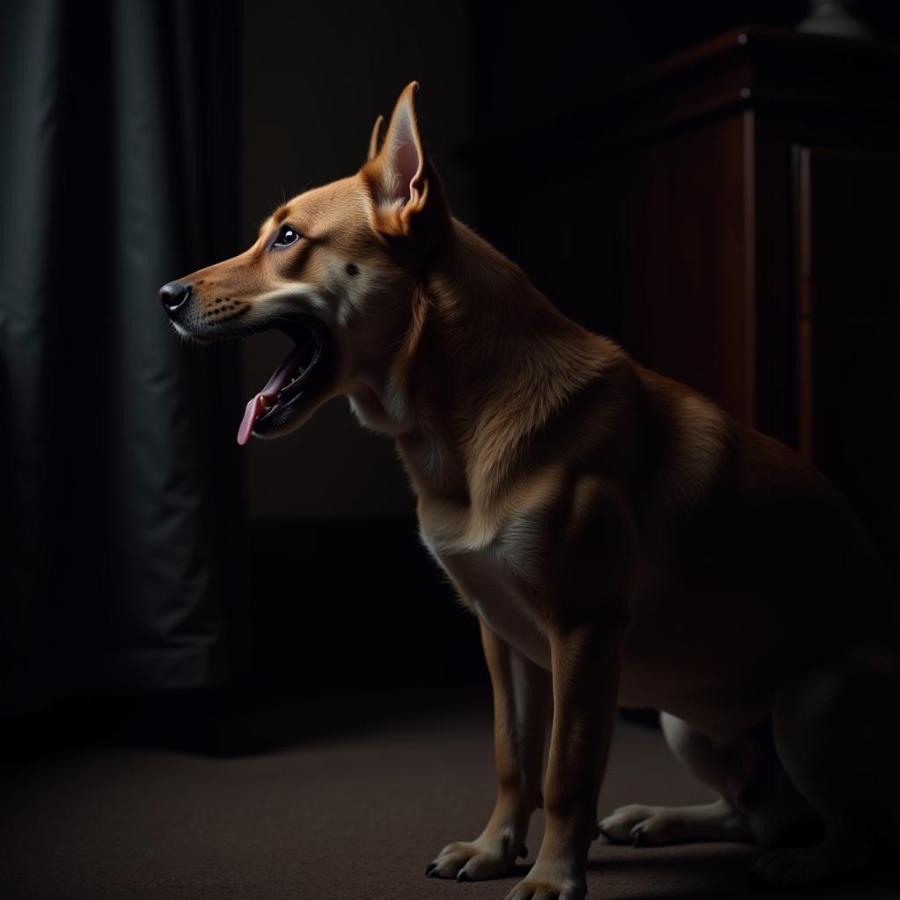Is your furry friend keeping you up at night with their plaintive whimpers? A dog whining at night can be frustrating for both you and your pup. Understanding the reasons behind this nighttime noise is the first step to a peaceful night’s sleep for everyone. From physical discomfort to separation anxiety, we’ll explore the common causes of nighttime whining and provide solutions to help your dog (and you!) rest easy.
Decoding the Nighttime Whines: Common Causes
Several factors can contribute to your dog’s nighttime whining. Identifying the root cause is crucial for addressing the issue effectively.
Physical Discomfort
- Pain or Illness: Just like us, dogs can experience pain or discomfort due to illness or injury. Arthritis, an upset stomach, or even a simple splinter can make your dog whine, especially at night when it’s quiet and distractions are minimal. If you suspect your dog is in pain, a visit to the veterinarian is crucial.
- Age: Senior dogs may whine more due to cognitive decline or increased physical discomfort. Providing a comfortable bed and a predictable routine can ease their anxiety.
- Potty Needs: A full bladder can definitely lead to whining! Ensure your dog has had a chance to relieve themselves before bedtime.
Emotional Needs and Anxiety
- Separation Anxiety: Dogs who are strongly attached to their owners may whine when left alone at night. This is a common cause of nighttime whining, especially in younger dogs or those new to your home. Creating a safe and comfortable sleeping space, along with gradual desensitization training, can help alleviate separation anxiety.
- Fear or Anxiety: Loud noises, thunderstorms, or even changes in their environment can trigger fear and anxiety in dogs, leading to nighttime whining. A calming pheromone diffuser or a snug-fitting dog sweaters for warmth can help create a sense of security.
- Attention-Seeking Behavior: Some dogs may whine simply to get your attention. While it’s important to address their needs, avoid reinforcing this behavior by immediately responding to every whine.
Environmental Factors
- Temperature: Is your dog too hot or too cold? Make sure their sleeping area is temperature-regulated and they have appropriate bedding. A cozy crate for small dog can help them feel secure and warm.
- Hunger or Thirst: Ensure your dog has access to fresh water throughout the night and has been fed appropriately before bedtime.
- Boredom: A lack of mental and physical stimulation during the day can lead to restlessness and whining at night.
What to Do When Your Dog Whines at Night
Rule Out Medical Issues
The first step is to ensure there’s no underlying medical condition causing the whining. Consult your veterinarian for a thorough checkup.
Create a Comfortable Sleeping Environment
A cozy and secure sleeping space can make a world of difference. Provide a comfortable bed, ideally in a quiet area of the house. For small breeds, consider small dog crates as they offer a den-like environment that many dogs find comforting.
Establish a Consistent Routine
A predictable bedtime routine can help your dog relax and prepare for sleep. This could include a short walk, a quiet playtime, and a final potty break before bedtime.
Address Separation Anxiety
If separation anxiety is the culprit, gradual desensitization training can be beneficial. Start by leaving your dog alone for short periods and gradually increase the duration.
Ignore Attention-Seeking Whining
If your dog is whining for attention, avoid rewarding the behavior by giving in. Instead, wait until they are quiet before offering praise or attention.
Why Is My Female Dog Whining at Night?
Female dogs may whine at night for all the same reasons as male dogs, but hormonal changes associated with their reproductive cycle can also contribute. A female dog in heat may whine more due to discomfort or anxiety.
 Dog barking at night
Dog barking at night
Expert Insights
Dr. Emily Carter, a veterinary behaviorist, advises, “Consistency is key when addressing nighttime whining. Establish a clear routine and stick to it. This helps your dog understand what to expect and can reduce anxiety.”
Jane Miller, a certified dog trainer, adds, “Ignoring attention-seeking whining can be challenging, but it’s crucial for breaking the cycle. Rewarding quiet behavior will eventually teach your dog that whining won’t get them what they want.”
Conclusion
Addressing your dog’s nighttime whining requires patience and understanding. By identifying the underlying cause and implementing appropriate solutions, you can help your furry friend – and yourself – enjoy peaceful nights. Remember to consult your veterinarian to rule out any medical issues, and consider working with a certified dog trainer for personalized guidance.
FAQ
- Is it normal for puppies to whine at night? Yes, puppies often whine at night due to separation anxiety or the need to potty.
- Should I ignore my dog’s whining? It depends on the cause. Ignore attention-seeking whining, but investigate if it’s due to pain or discomfort.
- How can I create a calming environment for my dog at night? Provide a comfortable bed, a quiet space, and consider using a calming pheromone diffuser.
- Can training help with nighttime whining? Yes, especially for separation anxiety. Gradual desensitization can be very effective.
- When should I consult a veterinarian about my dog’s whining? If the whining is sudden, persistent, or accompanied by other symptoms, consult your vet immediately.
- What if my dog continues to whine despite my efforts? Consider consulting a veterinary behaviorist or certified dog trainer for further assistance.
- Can medication help with my dog’s nighttime whining? In some cases, medication may be necessary, especially for severe anxiety. Consult your veterinarian to discuss options.
You Might Also Be Interested In:
Beaut Dogs is your one-stop resource for all things dog-related, offering expert advice and guidance on various breeds, care tips, and product recommendations. When you need support, contact Email: [email protected] to receive detailed and accurate answers from Beaut Dogs. We’re committed to helping you provide the best possible care for your canine companion. Visit us at https://beautdogs.com.